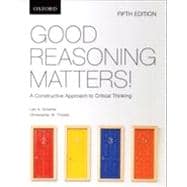Designed to help students develop the quality of their thinking and to respond effectively to often confusing and contradictory messages, Good Reasoning Matters! offers an indispensable guide to evaluating and constructing arguments. In addition to examining the most common features of faulty reasoning, the text introduces a variety of argument schemes and rhetorical techniques that will help students solve problems and construct sound arguments. Extensive exercises and examples taken from such sources as social media sites, newspapers, and topical news articles encourage students to consider a wide range of views and perspectives.
The fifth edition features a glossary, chapter summaries, extensive revised exercises, and a revamped Companion Website.








